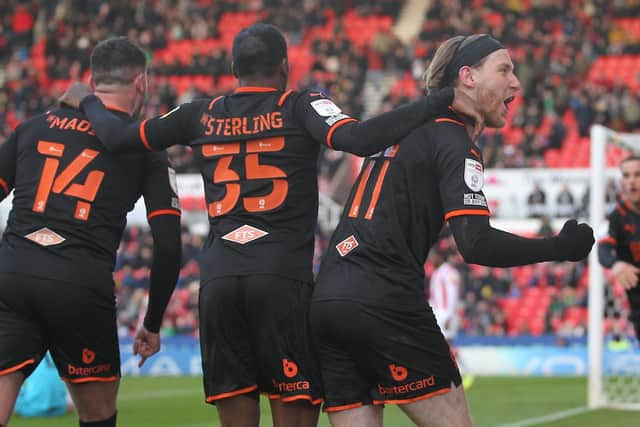Opinion: If football doesn't learn from Blackpool's story, it never will
and live on Freeview channel 276
Neil Critchley said as much himself last week when discussing his two-year anniversary; it’s all about the next game, the next training session. No good will come from resting on your laurels.
But for the rest of us mere mortals, reflecting on history is an integral part of being a football supporter. That’s especially the case if you’re a Blackpool fan.
Advertisement
Hide AdAdvertisement
Hide AdIf you don’t endure the downs, the ups don’t mean anywhere near as much. It’s why I could never support a side like Manchester City, because well, what’s the point?
For those of a certain vintage who witnessed City’s darkest days down in the third tier, then maybe their relentless success might mean something. But it’s otherwise a bit soulless, isn’t it?
‘Oh, are we going to win 4-1 today or 5-1?’ must be the only feelings of jeopardy they have until they face a side anywhere near their level, which is limited to a select few clubs spanning the globe.
This isn’t meant to be a column digging out Man City, it’s just that they’re the most obvious example, but compare the Etihad Stadium on a match day to Bloomfield Road. Why is one absolutely bouncing, while the other is muted and discreet?
Advertisement
Hide AdAdvertisement
Hide Ad

It’s because Blackpool have had to fight and scrap their way just to be able to enjoy attending a game against Swansea City.
A home fixture between two mid-table sides might not sound like much on the face of it, but try telling that to the hordes of Seasiders who will be in fine voice once again come 3pm.
I detest it when clubs like Liverpool and Barcelona claim “this means more”, inevitably plastering the slogan on scarves and other items of merchandise to flog around the world to people who have no connection to their cities whatsoever.
But for Blackpool, it still rings true. The club is now rooted back in the community once again after years of what seemed at the time to be irreversible damage.
Advertisement
Hide AdAdvertisement
Hide AdIt’s fitting then, that this week marked three years since the end of the boycott, the day almost 16,000 fans rammed inside Bloomfield Road for the Homecoming against Southend United.
The actual 90 minutes and the end result was largely irrelevant, although the sporting gods were clearly looking down on the Seasiders when Taylor Moore - a player who would later join the club on loan - gifted Terry McPhillips’ side an equaliser in the 96th minute.
Emotion spilled over, resulting in dozens of supporters entering the pitch to celebrate with the players.
It wasn’t because the point meant a great deal in the grand scheme of things, although Blackpool were within touching distance of the League One play-offs at the time.
Advertisement
Hide AdAdvertisement
Hide AdNo, it went beyond one game of football. It was a release of pent-up emotion, anger, bitterness and hurt. This was their day.
They had kept themselves away from their spiritual home for four and in some cases five years in what remains to this day the most effective and storied example of supporters voting with their feet.
Look at all the other clubs that have endured crises in recent times, there’s still many to this day. Why has no other set of supporters come together like Blackpool fans did to try and force change?
I appreciate context is key and the circumstances vary from club to club. The suing of fans clearly crossed a line for many that knew from that point onward they would never step back inside Bloomfield Road until the Oystons had gone.
But it’s also because Blackpool are different.
Advertisement
Hide AdAdvertisement
Hide AdIf you don’t believe me, I urge you to read Nathan Fogg’s book ‘How Not To Run A Football Club’, which is due to be released on Monday.
It’s a comprehensive, detailed account of Blackpool’s fans’ fight to free themselves of the Oyston shackles.
Having been fortunate enough to be sent an advanced copy, I can heartily recommend you buy a copy.
There are things in there I was never aware of, some unheard stories and shocking revelations that even the most ardent fan who paid attention to every minute detail of the boycott might not be aware of.
Advertisement
Hide AdAdvertisement
Hide AdI couldn’t put it down, so much so I read it from front cover to back cover within five hours on Tuesday evening.
Even if you’re not a Blackpool fan, I’d suggest it’s integral reading. The Blackpool story should be used as a blueprint of not what to do, whether that be the detestable actions of the ownership or the utter failure of the authorities to step in.
It will leave you angry, but uplifted at the same time. Blackpool’s eventual story is one of redemption. They’re one of the lucky ones who managed to find that owner that every club craves, that invests significantly and has the community at the forefront of his mind.
Compare that to the geo-political issues that are plaguing clubs at the top end of the pyramid, where states are using football clubs as a vehicle to sportswash.
Advertisement
Hide AdAdvertisement
Hide AdBut away from Bloomfield Road, clubs are still being failed. The authorities are still powerless, or if they do have power they’re too afraid to use it. Fans are still having little or no say in how their clubs are being run.
If football doesn’t learn the lessons from Blackpool’s tale, they never will.

